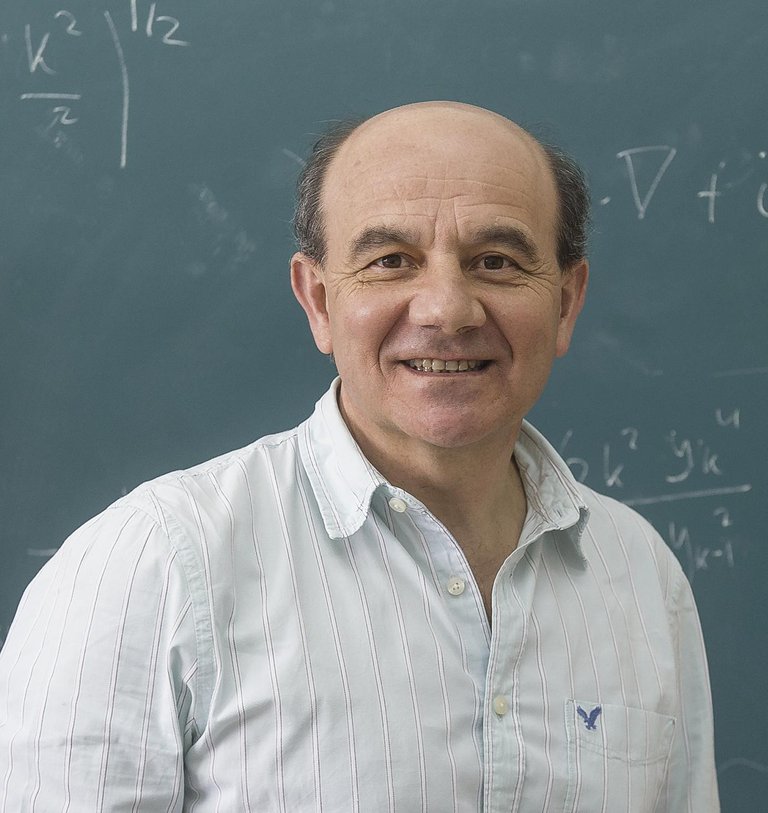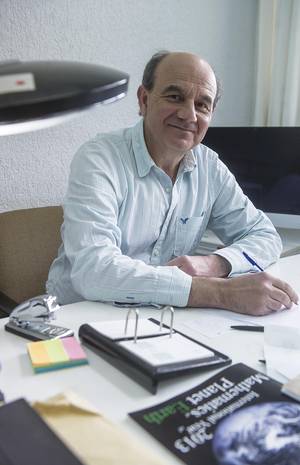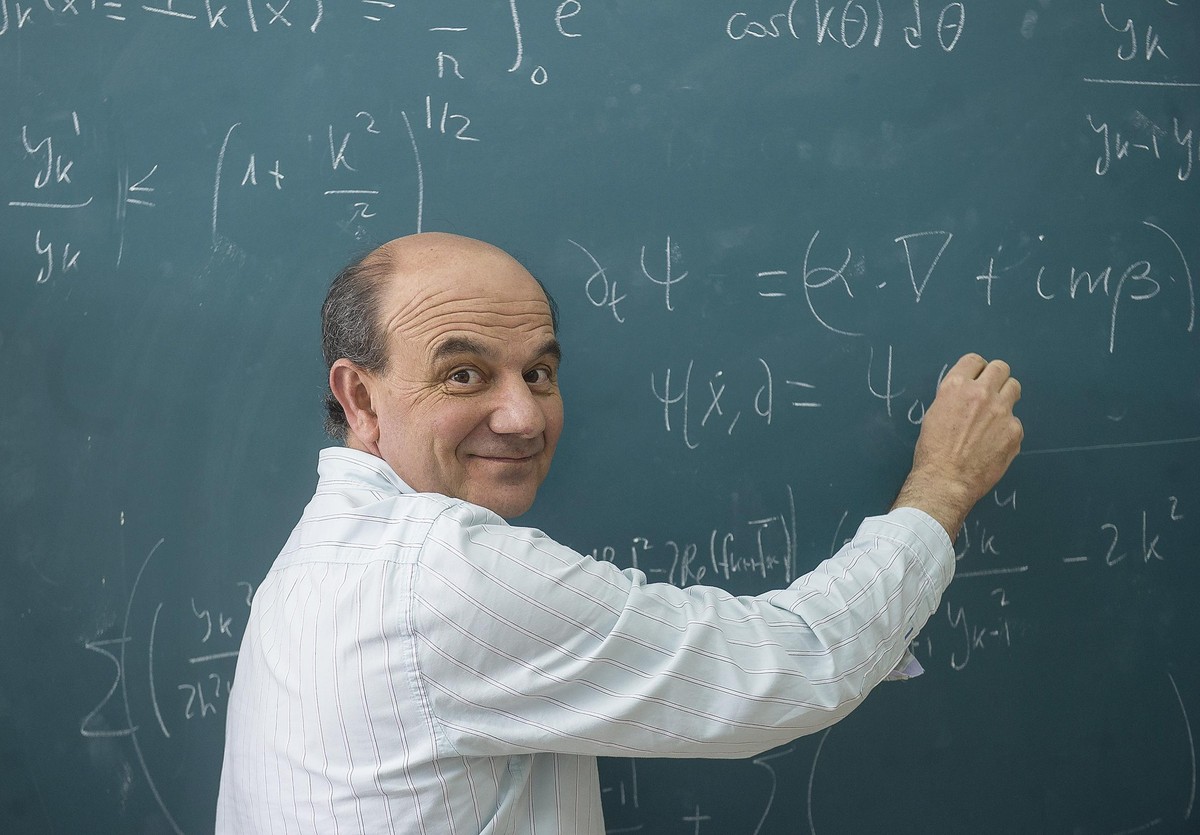"A good math is useful because it is to subtract a law from nature"

Very happy. It has come to me very well. In addition, the two departments of Mathematics of the Faculty of Science and Technology presented me to the awards, which is satisfactory. I think the whole team has been happy.
The group here, of analysis and equations with partial derivatives, is very good. The year after my arrival came Luis Escauriaza, and the team we formed with Julián Aguirre, Javier Duoandikoetxea, Miguel Escobedo, Adela Moyua and Juan Carlos Peral has never been behind other Spanish groups. And if we compare ourselves with those from outside we also adapt perfectly. For me this has been a good place.
I did the thesis at the Autonomous University of Madrid, together with his partner Javi Duoandikoetxea. We both work in the same framework, with the transformation of Fourier, but not with the same thesis director. There I was from 1982 to 1988. It was a very good time. There were many young newcomers from the United States. My memory is that there was a real scientific environment. And there was a lot of desire to work. That is very important and very difficult to get. From the perspective, I think it was a good place to perform the thesis.
France has, has had and will have a great mathematical tradition. That is the big difference between this country and France. They have taken care of mathematics for 200 years and not just mathematics. Here it is not so clear.
The best math sites are always: Princeton, MIT, Harvard of course (although not in my field), the University of California with Berkeley and UCLA, but also with the Universities of San Diego and Santa Bárbara. And in the Midwest the University of Chicago. In the last 50 years the University of Chicago has been a benchmark in the field of Fourier's transformation, in my field. I had to go there to investigate the transformation of Fourier, and I went there. I was there a little over two years.
It was a very good experience. I went to the right place, at the right time, and found myself with right people. That is not always so. Of course, you always have to try to go to a good place, but that doesn't guarantee you find the right people. There I worked for a year with the Argentine Carlos Kenig, a student of Calderón, one of the great names of the University of Chicago, and the Venezuelan Gustavo Ponce. We almost arrived and soon started to talk about mathematics. It was in October 1988 and today we work together. I have published 40% of my articles with them, although we were only one year together in Chicago. For me it was very special: you have had a good training and suddenly you become like flying.
Yes. It cannot be said that the Autonomous University of Madrid is the best in the world because it is not the best, but that is not as important as being with adequate people. Maybe at Princeton it's not going so well, because there's no good atmosphere. To a large extent it is random, even if you look for it.
When I returned, I wanted to stay here in Bilbao; my wife and I came looking for work, but we didn't get it. Yes, in October 1990 I was able to return to the Autonomous of Madrid. Later they offered me a job and I came in 1993.
It is an equation of partial derivatives. Schrödinger's equation is called Schrödinger by quantum mechanics, but it is actually an earlier equation. Because I am interested in this moment a model of the equation of 1906, in which the potential is not linear. It has to do with the strands of turbulence of a fluid. Schrödinger discovered a cubic equation in 1970, 65 years later. But the equation of partial derivatives itself is earlier.
I am not a physicist. I use mathematics to understand physics; if not, I find a story to physics. I always wonder: Do you know what they are talking about? And I'm sure there are people who know it, of course. But I use equations, for example, to try to understand what Dirac said. The Dirac equation is an exceptional mathematical object, with a life of its own and which has to do with more things than with relativistic quantum mechanics.
To begin with, not only should we talk about the number of appointments, but also about the quality of the quotations. In the ranking of Shanghai, on the one hand, the university itself is valued as a whole. In addition, other specific characteristics are evaluated in areas and subjects. In the fields, mathematics coexists with the natural sciences and are only found in the contents. If you look at this ranking of Shanghai you will see that from all the UPV only appear mathematics. And in that the "Highly cited research" has great importance. I am that "researcher often mentioned". But the UPV/EHU is not on the list that includes mathematics with natural sciences.
It is important to be in this ranking to pay attention to mathematicians. When evaluations of scientific projects are made, as explained in mathematics along with natural sciences, it is very difficult to respond to some criteria. Have a minimum number of patents, for example. Or, for example, those who do a basic research in mathematics have no relationship with companies.
Training in mathematics at French high school is evident. And it is evident that it has an important social role. Whatever it may be, in our country this has not been so. That's a big drawback. What's more, it's ridiculous: some dressed people proudly transmit that they are illiterate in science and, above all, in mathematics. It is incredible, it is as if I proudly said that I am not able to distinguish between violin and trumpet.
The question is mythical for what does mathematics serve? ". A good math will be useful sooner or later, because what you have done has been to subtract a law from nature. Before or after, you will use it for something. The biggest problem is that many times it is "later" than "before". You have to wait long until you find an application and normally it comes by the most surprising route.
In my career they have subsidized me from the beginning. That I have to be very clear and I also have to thank you. I am a public money product. And like me, above my generation, also from the previous 5 years, perhaps from the previous 10, and it is not clear how many years after my generation. And the results are in sight and the consequences are evident. It is a generation that began to receive money in 1986 and that, for more than 25 years, has had constant financing. But you stop entering 3 or 4 years and the consequences can be dramatic. To see if there is luck and if this crisis does not destroy everything achieved.--> See here the photos and video of the award ceremony
Buletina
Bidali zure helbide elektronikoa eta jaso asteroko buletina zure sarrera-ontzian










